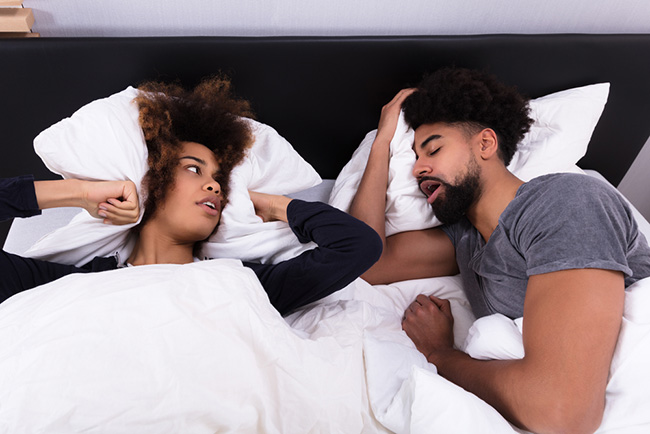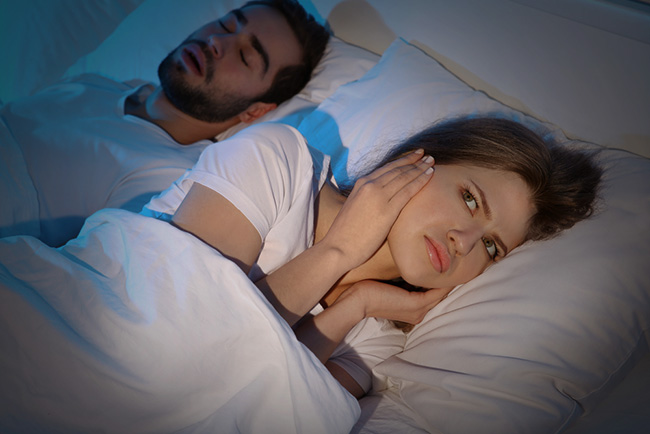Baby Making Noise Seems to Be Trying to Push

Only when you thought you were dropping off to sleep, your partner irritably shakes yous awake. A conversation forth these lines takes place:
"Y'all're making that weird noise again!"
"What dissonance?"
"You know, with that horrible groaning audio that goes on for ages. I can't sleep with you lot doing that…"
If this sounds familiar, it could be that you're suffering from catathrenia.
What is Catathrenia?
Sometimes known equally nocturnal groaning, catathrenia is a sleep disorder which falls nether the category of slumber-related breathing disorders.
People who have catathrenia will typically exhale in deeply while sleeping. They and then concord their breath for a short while. When they breathe out if may sound like a long groaning, moaning or shrieking racket.
The noise can last from a few seconds upwardly to a minute. And at the end of the groan, they might make a secondary noise like a snorting, or they might as well wake up.
Sometimes embarrassing
The noise made can be very loud, and for some people can even audio similar a sexual racket. This can be quite disturbing or annoying for other people in the household who hear information technology, not to mention embarrassing for the person making the noise.
Catathrenia unremarkably occurs during the Rapid Eye Movement (REM) stage of sleep, though tin can occur in other sleep stages.
People who have catathrenia will usually experience information technology for many years, and during this fourth dimension will in many cases experience it almost nights. And unless their partner can sleep through the noise, it tin can become a source of frustration for both people.
Some researchers further advise in that location could exist sub-types of catathrenia, for example depending on whether the noise made on each out-breath is short or long.
What Catathrenia isn't
As it'south not a very common sleep disorder, catathrenia is sometimes confused with other sleep disorders or wellness problems. So it's important to sympathize that information technology isn't whatsoever of the following:
- Snoring. The piece of cake mode to tell the difference is that snoring normally takes place on the in-breath, whereas catathrenia takes identify during the out-breath.
- Related to exhalatory snoring (which seems similar it contradicts the first point). The noise in this kind of snoring is also made on the out-breath. However, people with catathrenia pause afterwards breathing in.
- Sleep apnea. Fifty-fifty though both disorders involve a pause in animate, there's a fundamental difference. With apnea the pause happens after breathing out; with catathrenia the pause happens afterward animate in.
- Stridor, which is a potentially dangerous condition where a person lets out a high pitch audio due to a constriction of the airways.
- Sleep talking. Despite the fact that sometimes people can make a very strange sound, it isn't the same equally sleep talking.
- Moaning which occurs during epileptic seizures.
- Related to any other breathing disorder.
When forming a diagnosis, a medical professional would want to rule out the above possibilities, particularly the more than serious weather like apnea, epilepsy, and stridor.
What causes catathrenia?
As with many sleep disorders, the exact cause is nonetheless in contend among the medical and scientific customs. There take been various theories put forward, including:
- Obstruction or restriction of the upper airway.
- During REM sleep, the vocal cords may partially shut off. A forced out-jiff then takes place to push button through this closure and unblock the vocal cords.
- Damage to brain structures that command breathing.
- There take also been suggestions it'south connected to loftier stress levels.
Unfortunately, there hasn't been every bit much research done into the physiopathology of catathrenia every bit other sleep disorders which are thought to accept more serious consequences if unmanaged.
Despite the lack of consensus as to the cause, information technology seems many researchers believe an obstruction or restriction of the airways is involved; what causes that restriction in the get-go place isn't clear though.
Treatment
Many people don't fifty-fifty realize they make the noise until a partner or someone sleeping in their house tells them.
Talking with a medical professional or having a sleep study conducted is the best manner to make certain catathrenia is identified correctly.
You may exist diagnosed purely from your history and reported symptoms. But yous might be asked to have an overnight sleep study in a sleep center.
Post-obit this there are 2 ways of looking at treatment:
- Should the sufferer wait at ways to address the problem?
- Should the person who is beingness disturbed observe ways to cake out the noise?
Interestingly, researchers in 2017 who looked into catathrenia made some recommendations for possible future treatment research avenues.
They say:
Direction for further research could involve consideration of deep breathing exercises, yoga, meditation, or myofunctional therapy to help abate symptoms.
In the surveys they investigated for their study, the nigh common comorbid medical conditions were feet and depression, which peradventure explain why those techniques could be helpful. Then if this applies to you, perhaps it'southward worth trying self-aid, or reaching out for professional help if yous haven't already.
The data likewise suggests that alcohol apply, smoking and recreational drug apply could be factors to consider. This is an area where some experimentation at home (with reduction!) could prove fruitful.
And interestingly, the survey results likewise appears to advise swimming could be a gene. And so if yous're a swimmer, possibly keep an eye on whether it'south worse on days you've been in the water.
Successful handling with a CPAP machine
Researchers at Stanford Academy establish in astudy of seven patients that a Continuous Positive Airways Pressure (CPAP) machine helped resolve the nocturnal groaning for all of them.
A CPAP machine delivers air gently through the nose to keep the airways open and is regularly used by people who take apnea.
In that study, five people also chose to have surgery later on on. And of the four people that reported dorsum afterwards to the researchers, three needed an oral device as well.
It might sound like information technology was quite an ordeal for those in the study, but the good news is that all four were somewhen cured.
And in 2012, researchers in Espana gave iv people from their group of x sufferers a CPAP auto, finding that all of them has significantly less moaning events.
More than recently, in 2020 researchers published a case written report of a patient with catathrenia who was successfully treated with the lowest CPAP force per unit area settings.
They explain that CPAP machines are known to exist problematic for some people equally they don't like wearing them. They suggest that perhaps only needing the lowest setting might make it easier for people to continue using.
They say in their study:
…catathrenia is an uncommon disorder characterized past a distinct animate pattern in which CPAP treatment seems to be effective but its utility is limited past poor patients acceptability. Setting CPAP pressures to command cathatrenia events (leaving aside catamenia limitation) could be related to meliorate CPAP compliance.
Blocking the audio

It seems then that using a CPAP car is currently the nearly successful treatment offered. Withal, non everyone finds them comfy enough to wearable in the long-term.
One alternative is for people who are being disturbed by the racket to try and block out the sound as much every bit possible. Wearing earplugs could help in some circumstances, though mayhap not reduce the audio completely if information technology'due south very loud.
It might help if you're hearing it from some other bedroom in the same house, merely perhaps not if you're right next to the person making the groaning noises.
Another pick is to employ headphones and listen to music or white dissonance if yous similar that. Good noise-cancelling headphones might add together an extra boost to the audio masking too.
So if you're unable to discover ways for you and anyone else living with you lot to cope, or are concerned that yous might have a different sleep disorder, you may find seeking medical advice a good first footstep.
Readers' tips
Several readers accept commented to say that they constitute raising their pillows helped cease the groaning sounds. I haven't seen this published as a recommended treatment, just it's great that readers recall it helps.
Some have also offered the suggestion of avoiding sleeping on your back. Again, this doesn't accept research to dorsum it up, but information technology's worth trying out.
There have as well been suggestions that it's worse with stress and sleep impecuniousness. So try to stay on top of both your daily stress levels and make certain you get enough sleep.
I'd be very grateful if y'all could exit a annotate to say if these ideas work for y'all, if you decide to try them or already have done. That way I can write in more detail about how often information technology helps people.
And if you take whatever other suggestions for coping mechanisms that might benefit other readers, please feel free to leave a comment below.
Source: https://www.nosleeplessnights.com/catathrenia-are-you-making-strange-noises-while-sleeping/
0 Response to "Baby Making Noise Seems to Be Trying to Push"
Post a Comment